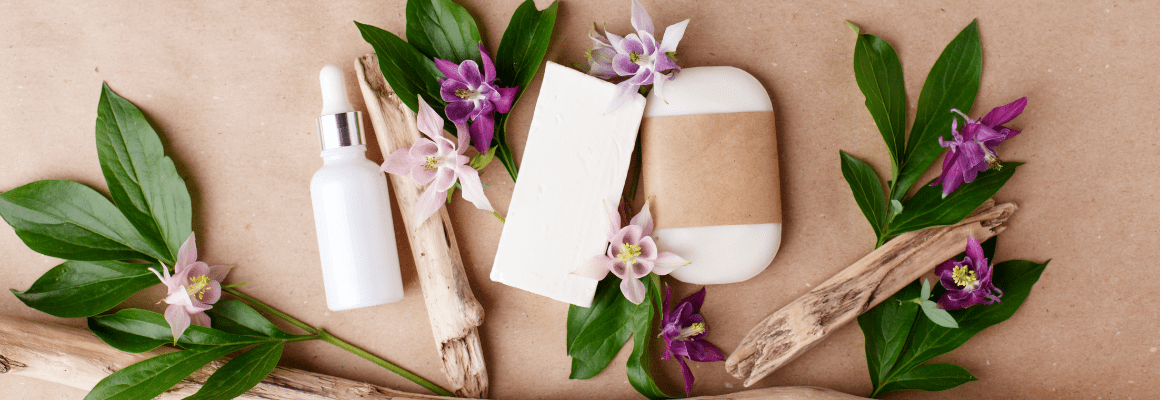Are you looking for a new skin care product to treat your itchy skin but are not sure what you’re looking for? With so many products in the market, we know it can be tricky to find a skin solution that works for you. Unfortunately, many skin care products contain harmful chemicals or harsh toxins that can cause a negative reaction or further aggravate your already sensitive skin. Some of these bad ingredients may even lead to cancer - yikes!
For this reason, we are big advocates of clean beauty products. Clean beauty celebrates natural ingredients that work in harmony with your body and keep our planet healthy. A clean beauty product is transparent about the ingredients it contains and the production process. This makes it easy to read labels and know exactly what you are putting onto your skin: no mystery ingredients whatsoever!
In this post, we’ll highlight safe ingredients for itchy skin to look out for. We’ll also point out harmful ingredients that you should aim to avoid. Read on to discover the best safe ingredients for managing your itchy skin.
Why Do I Have Itchy Skin?
Dealing with itchy skin is never pleasant. It is distracting during the day when you are trying to concentrate at work or school, and it is disruptive during the night when you are trying to catch some much-needed shut eye. While there are many possible reasons you may have itchy skin, one of the most likely reasons is dry skin. While some people are born with naturally dry skin, certain factors can affect the degree of dryness. These include cold temperatures, old age, pregnancy, and skin conditions like eczema and psoriasis. Let’s go over some of these factors in more detail.
To start with, research shows that older people are more likely to experience itchy skin than their younger counterparts. This is because, as the body ages, it naturally produces less oil. Statistically-speaking, 50% of adults older than age 40 suffer from dry skin. In addition, pregnant women are also more likely to experience dry and itchy skin thanks to all the hormone changes. Why? The skin loses elasticity and moisture as it stretches to accommodate a growing baby. That’s why the main spot for itchiness is the stomach. That being said, pregnant women may also experience itchy skin on other body parts like the thighs, arms, and breasts.
Itchy skin is also more likely to affect those with certain health conditions. For examples, people who have diabetes, HIV/AIDS, or various types of cancer (such as leukemia or lymphoma), are more likely to experience itchy skin. The temperature also affects the skin. From your personal experience, you may have noticed that your skin tends to feel itchier during the winter. That’s because temperatures are cooler and humidity levels are lower. This eliminates moisture from the skin causing dryness and the subsequent itchiness.
Another factor that dries out the skin is prolonged exposure to water. This explains why people who work in water based jobs, such as catering, nursing, and hairdressing, are more likely to complain of dry and itchy skin as unfortunately, water has a drying effect on the skin
Finally, we cannot ignore the connection between allergies and itchy skin. Many potential triggers are common household objects that you likely come into contact with on a daily basis. These include things like cleaning supplies, laundry detergents, and cosmetic products. Exposure to the chemicals or toxins found in these products may trigger an allergic reaction and the accompanying itchiness. In addition, nickel is also known to be a common trigger for allergies. It can be found in everyday items like belt buckles, cell phones, jewelry, and zippers.
What is Eczema?
Eczema is an auto-immune disease that affects approximately 10% of the US population. Due to a damaged skin barrier that has difficulty retaining moisture, people with eczema suffer from chronically dry skin. This is what leads to the accompanying itchiness. Although eczema comes in many forms, the most common types of eczema include atopic dermatitis, contact dermatitis, nummular eczema, and seborrheic dermatitis. Although these different types of eczema have different symptoms, in general, eczema is characterized by rough patches of redness, flakiness and itchiness. If intense scratching persists, the skin may even develop a rough, leathery texture. This is known as lichenification. Symptoms of eczema may come and go with varying degrees of intensity. For example, a person may go through intense flare ups during the winter months where at other times of the year, symptoms may barely be noticeable. One of the most burdensome symptoms of eczema is itchy skin.
While eczema usually develops during childhood, the chronic condition can develop at any age. Even adults can suddenly develop the condition even if they never had it growing up. It can appear anywhere on the body but the most common spots include the hands, feet, cheeks, creases of elbows, and bends of knees. Although researchers aren’t exactly sure what causes this skin condition, it’s believed to be linked to a combination of genetic and environmental factors. For example, many people experience flare ups after contact with certain triggers. Top eczema triggers include fabrics like polyester and wool, ingredients in beauty products or cleaning supplies, pet fur, mould, smoke, stress, and even the food you eat. While triggers can be different for everybody, one thing is certain: eczema is not contagious.
Although there is currently no cure for this condition, there are ways to reduce and manage eczema symptoms in order to lead a happy, healthier life.
What is the Itch-Scratch Cycle?
The itch-scratch cycle can affect those with eczema, dry skin, or itchy skin in general. If you’ve ever experienced any of these conditions, you likely already know the effects of the cycle well. When the skin feels itchy, our natural reaction is to scratch the itch to find relief. However, scratching is actually one of the worst things you can do. While it may offer temporary relief, it can make things worse in the long run by setting the itch-scratch cycle in motion. This can lead to problems like bleeding, damaged skin, increased inflammation and, in severe cases, even infection.
So, how exactly does the itch-scratch cycle work? According to The National Eczema Association (NEA), itch and pain have a yin-yang relationship. This means that when you scratch your skin, you subject it to low-grade pain which offers temporary distraction from the itch. While the urge to scratch may temporarily subside, the itch comes back stronger than ever.
Although it is challenging and requires a lot of will-power, it’s possible to break the itch-scratch cycle once and for all. Your skin will thank you!
Ingredients to Avoid
A great way to combat dry skin and reduce the itch is by applying a moisturizer. This is where it’s super important to read labels carefully and watch out for any ingredients that will do more harm than good. Harmful toxins or chemicals can negatively affect your skin and lead to a bad reaction or flare-up. It’s important to bear in mind that everyone’s skin is different and what causes a reaction in one person, may not do the same for you. That being said, common culprits include ingredients such as parabens, phthalates, petrolatum, p-phenylenediamine (PPD) and artificial fragrances. These ingredients are not safe for your skin or our planet. In addition to leading to an allergic reaction or flare up, they can even interfere with hormone function or potentially lead to cancer. Although reading skincare labels takes more time and effort, your health is worth it.
Best Ingredients to Look for in Skin Care
It’s not all doom and gloom! There are plenty of safe ingredients to add to your skin care routine to beat the itch, starting with one of our favorite natural remedies: aloe vera. This powerful plant is extremely moisturizing which makes it an ideal choice for anyone suffering from dry and itchy skin or eczema. It can also help reduce inflammation and heal broken skin, lessening the risk of infection.
Coconut oil is another favorite. It is extremely hydrating, thanks to its ability to quickly permeate the skin. This helps it moisturize the skin and combat any dryness from eczema, psoriasis, or other skin conditions. It is also rich in lauric acid, which helps reduce the risk of infection if relentless scratching causes the skin to crack or bleed. To benefit from the powerful health benefits of coconut oil, consider taking a coconut oil bath. Be sure to use lukewarm water as unfortunately, hot water may feel soothing in the moment but actually has a tendency to further dry out the skin. You can also apply coconut oil directly to slightly damp skin.
Finally, colloidal oatmeal is another great natural choice. This is a special type of finely ground oatmeal that can easily dissolve in water. Because it is rich in beta-glucans, it helps to reduce inflammation and relieve itchiness. In addition, it helps to replenish lost moisture and soothe any irritation. Consider taking a colloidal oatmeal bath by grinding 2-3 cups of the oatmeal in a food processor or coffee grinder. Then sit back, relax, and enjoy!
Natural Skin Care to Beat the Itch
If you suffer from eczema or itchy skin, we highly recommend you nourish your body with gentle and soothing skin care products like our Body Care Essentials. This natural skin care kit includes our best-selling Organic Manuka Skin Soothing Cream and our gentle Coconut and Sunflower Oil Soap Bar. Both of these products are made with pure and wholesome ingredients that consider the safety of your skin and our planet. Because they are so gentle, they are perfect for little ones, adults, and everyone in between. Feel free to use the products anywhere on the body from hair to toe, including delicate areas like the lips and eyelids.
Eczema and Wet Wrap Therapy
A great way to provide the skin with a boost of moisture and target those problem areas is with wet wrap therapy. Wet wrap therapy is a simple at-home treatment.. It involves applying a natural cream to the problem spot and then covering with a wet piece of clothing such as these Remedywear™ Eczema Sleeves. These sleeves are particularly useful in targeting hard-to-reach areas like backs of knees and bends of elbows. To lock in the moisture and allow the emollient to better permeate the skin, add a dry layer over the top. Leave the wet wraps on for a minimum of 2 hours or overnight. Don’t forget to apply another layer of moisturizer once you remove the wet wraps.










